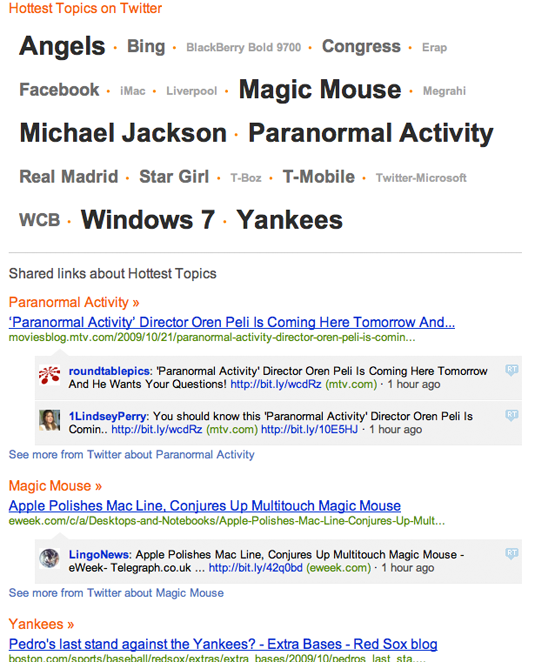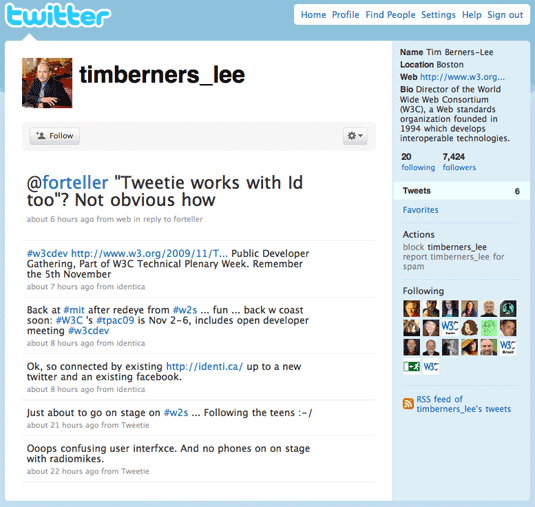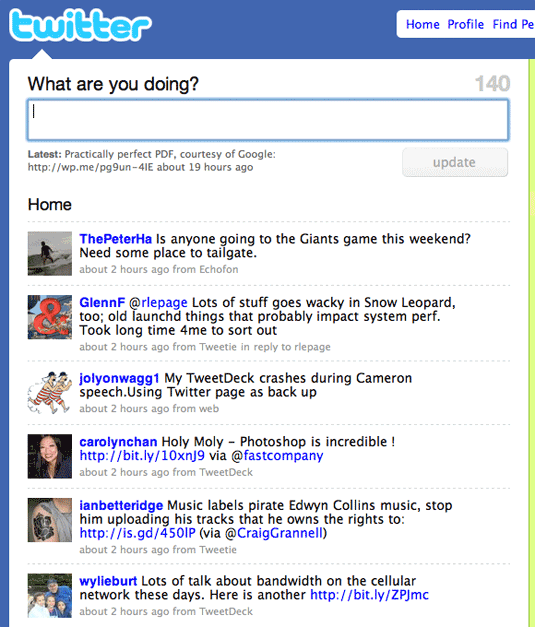 Back in July, Bing added some not-very-exciting Twitter integration to its search results. Today at the Web 2.0 Summit here in San Francisco, Microsoft confirmed the news that All Things Digital’s Kara Swisher broke (and my colleague Ed Oswald wrote about): Bing has a deal with Twitter to provide a much more sophisticated level of Twitter search within Bing. We just saw a demo of the new features, which are supposed to be live at http://www.bing.com/twitter shortly. (I’m getting that home page, but an error when I try to search.)
Back in July, Bing added some not-very-exciting Twitter integration to its search results. Today at the Web 2.0 Summit here in San Francisco, Microsoft confirmed the news that All Things Digital’s Kara Swisher broke (and my colleague Ed Oswald wrote about): Bing has a deal with Twitter to provide a much more sophisticated level of Twitter search within Bing. We just saw a demo of the new features, which are supposed to be live at http://www.bing.com/twitter shortly. (I’m getting that home page, but an error when I try to search.)
(As Kara reported, Bing also has a deal in place to provide results from Facebook, but those tools won’t show up immediately. Given the face that Facebook is so much more private than Twitter, I’m curious to see how Microsoft makes Facebook-within-Bing make sense.)
It’s impossible to judge a search engine from a brief onstage demo, but Microsoft’s goals are worthy, at least. Basically, it sounds like it’s trying to provide the service that Twitter’s own search should be but isn’t: The results weed out duplicate retweets and pointless blather, try to determine the most worthy Twitter users and push their items to the top, and show where short URLs are going. It’s also got features to spotlight Tweets that contain useful links. And the home page you get before you do a search provides Tweets on hot topics grouped by subject matter–a little like what Google News might look like if it pointed to nothing but Tweets.
The service will be especially useful if it’s easier to find old-but-still-useful Tweets than it is at Twitter itself, but it’s not clear how far back its index goes. (Qi Lu, Microsoft’s head online honcho, wasn’t sure.)
If Bing’s Twitter search turns out to be good, one obvious question about it is this: Shouldn’t really good Twitter search be available at Twitter? We don’t know much about Twitter’s plans for its own search, but it’ll be a tad odd if the best way to find stuff on Twitter is to go elsewhere. (Then again, many of us go to Google to search within specific Web sites, since it usually does a better job than the search features within sites themselves.) Did Twitter help Bing with its search feature because it’s working on something even more advanced of its own? Might another shoe drop in the form of Bing’s Twitter search becoming Twitter’s own search feature? Will it let other search companies (no, I’m not thinking of anyone in particular) provide their own Twitter search features?
(Side note: Web 2.0 cohost John Battelle interviewed Twitter’s Ev Williams last night here at the conference. Unless I misheard, Williams said “Scalability today isn’t an issue for Twitter.” Which is an interesting take–I’ve repeatedly seen Mr. Failwhale and his “Too many Tweets!” message while Tweeting about the conference…)

 At Microsoft’s Professional Developer Conference in Los Angeles this morning, Seesmic announced that its Seesmic Desktop, a popular tool among Twitter power users, is coming to Windows. Finally!
At Microsoft’s Professional Developer Conference in Los Angeles this morning, Seesmic announced that its Seesmic Desktop, a popular tool among Twitter power users, is coming to Windows. Finally!



 Um, sounds like scalability issues to me, even if they’re temporary!
Um, sounds like scalability issues to me, even if they’re temporary!  Did I just hear another shoe dropping? Shortly after
Did I just hear another shoe dropping? Shortly after  Back in July, Bing
Back in July, Bing 
 Kara Swisher
Kara Swisher  When something’s awry with Twitter, we’re used to seeing the
When something’s awry with Twitter, we’re used to seeing the 